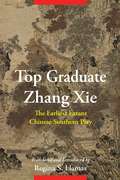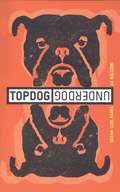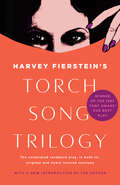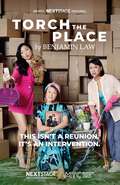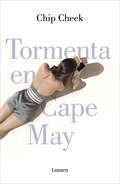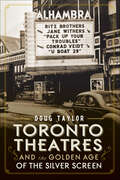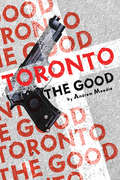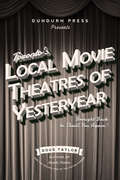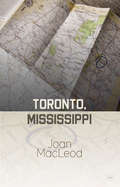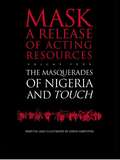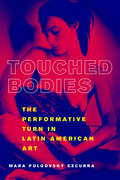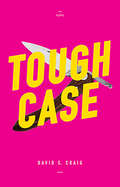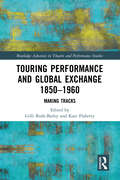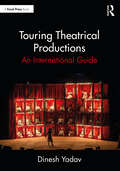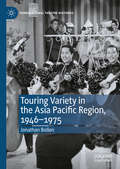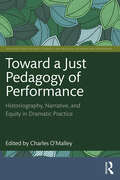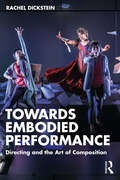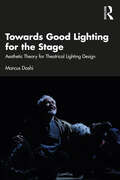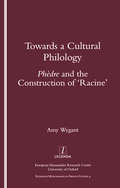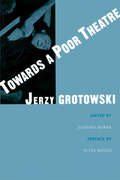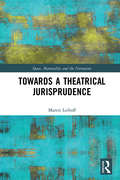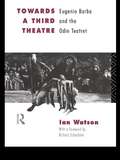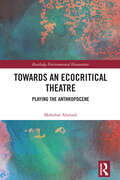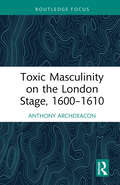- Table View
- List View
Top Graduate Zhang Xie: The Earliest Extant Chinese Southern Play (Translations from the Asian Classics)
by Regina S. LlamasTop Graduate Zhang Xie is the first extant play in the Chinese southern dramatic tradition and a milestone in the history of Chinese literature. Dating from the early fifteenth century, but possibly composed earlier, it is the work of a writing club called the Nine Mountain Society.The play relates the story of a talented scholar who sets off for the capital to take the imperial exams. On the road, he is robbed and beaten by a bandit. In a nearby village temple he meets an orphaned girl who nurses him back to health and whom he marries. Once he takes first place in the exams, however, he comes to regret the marriage, setting in motion a series of decisions with dire consequences. Underlying the drama are preposterous farce, a penchant for puns, and ingenious play on the conventions of theater.This story of love, ambition, and betrayal speaks to the tensions created by the expectations that family, society, and state placed on the scholar. The examination system offered families the promise of social and economic advancement through an official position. The state relied on these men for the administration of the empire, and society expected that education in the classics would produce moral men. The play offers a critique of the scholar’s ideal, the education system, and the ethical values this process was intended to instill.This first full English-language translation of Top Graduate Zhang Xie features a detailed introduction that discusses the foundations of Chinese drama and the play’s composition and performance.
Topdog/Underdog
by Suzan-Lori ParksA darkly comic fable of brotherly love and family identity is Suzan-Lori Parks latest riff on the way we are defined by history. The play tells the story of Lincoln and Booth, two brothers whose names were given to them as a joke, foretelling a lifetime of sibling rivalry and resentment. Haunted by the past, the brothers are forced to confront the shattering reality of their future.Suzan-Lori Parks is the author of numerous plays, including In the Blood and Venus. She is currently head of the A.S.K. Theater Projects Writing for Performance Program at the California Institute of the Arts in Valencia.
Torch Song Trilogy: Plays
by Harvey FiersteinA new edition of the classic drama portraying gay life in New York in the 1970s and 80s—winner of the Tony Award for Best Play, now coming to Broadway in a revival hailed by The New York Times as “irresistibly compelling.” What begins as a chance encounter in a New York nightclub leads drag performer Arnold Beckoff on a hilarious yet touching pursuit of love, happiness, and a life he can be proud of. <P><P>From a failed affair with a reluctant lover to a committed relationship with the promise of a stable family, Arnold’s struggle for acceptance meets its greatest resistance when he faces off against the person whose approval is most important to him: his mother. This edition contains for the first time ever both the original scripts for the three one-act plays (The International Stud, Fugue in a Nursery, and Widows and Children First!) as they were performed in the 1970s, as well as the revised script for the 2017 revival that condensed all three into Torch Song. It also includes a never-before-published introduction by Harvey Fierstein, as well as photographs from both the original production and the revival starring Michael Urie and Mercedes Ruehl and directed by Moisés Kaufman. <P><P>Praise for Torch Song Trilogy “Harvey Fierstein has created characters so vivid and real that they linger in the mind, talking the night away, long after the lights have been turned out and everyone has left.”—Time “Gorgeously funny . . . a devastatingly comic play with just the right resonances.”—New York Post “Sassy, sweet, and moving.”—People
Torch the Place: MTC NEXTSTAGE ORIGINAL
by Benjamin LawTeresa's mum finds it impossible to let anything go-from grudges to household objects. She thinks of her home as a museum full of irreplaceable treasures. But she's not really a curator, she's a hoarder, and her house is enough to give Marie Kondo heart palpitations. When her kids return home to celebrate her 60th birthday, she's over the moon to have the family back together. But this isn't a reunion. It's an intervention. Celebrated writer Benjamin Law is one of this country's brightest literary stars. For his hysterically funny and moving stage premiere, Law employs his effortless self-deprecating wit to spark joy in the clutter and find truth in those crazy moments that bring families closer together. Commissioned through MTC's NEXT STAGE Writers' Program with the support of our Playwrights Giving Circle Donors, The Ian Potter Foundation, Naomi Milgrom Foundation, The Myer Foundation, Malcolm Robertson Foundation and The University of Melbourne.
Tormenta en Cape May
by Chip CheekUna novela sobre el deseo y la fragilidad del matrimonio, por el último autor revelación de Estados Unidos «Una novela atmosférica sobre el deseo y la pérdida del apetito sexual en los Estados Unidos de los años cincuenta con guiños a clásicos como El gran Gatsby o Vía Revolucionaria.»The Independent Corre el año 1957 en Cape May, un pueblo costero de New Jersey. Henry y Effie, dos jóvenes recién casados, llegan de Georgia para pasar su luna de miel. Se acaba el verano y el lugar está desierto. A medida que se van conociendo -recorriendo las playas solitarias del Atlántico, infinito y oscuro; haciendo el amor con torpeza en la habitación polvorienta de un pariente lejano- intuyen que la vida de casados puede no estar a la altura de sus románticas fantasías. Cuando ya están decididos a acortar el viaje, ven luz en las ventanas de una de las casas vecinas. Son Clara, una glamurosa aristócrata que ve cómo se le escapa la juventud; su amante Max, un playboy adinerado, y Alma, la misteriosa y distante hermanastra de Max. La lujosa mansión y el pueblo vacío se convierten en escenario de sus aventuras desenfrenadas, y a medida que se cuelan en segundas residencias abandonadas, salen a navegar, pasean desnudos bajo las estrellas y experimentan con el amor y el sexo, Henry y Effie van dejando atrás la inocencia. Chip Cheek emerge en el panorama de las letras norteamericanas con una impactante novela sobre la pareja, el amor, el deseo y la traición. La crítica ha dicho...«Una narración magnífica y seductora, y una prosa seca como un Martini que recuerda a lo mejor de James Salter.»Lucy Foley «Un torbellino de suspense psicológico y reflexiones sobre el matrimonio que nos recuerda a Margot Livesey y Alice Munro. La ambientación de los años cincuenta, una prosa desnuda y una trama que avanza a ritmo vertiginoso hacen que esta primera novela, muy sensual, sobre la ética y el deseo se lea como un clásico.»Kirkus Reviews «Esta novela logra traer de vuelta recuerdos que pueden romper de nuevo el corazón -e incluso el alma- en mil pedazos [...]. Vivencias inspiradoras que sustentan un relato despojado e impactante.»Booklist «Una prosa sublime, agudeza psicológica y una historia fascinante que una vez empiezas no puedes soltar.»Teddy Wayne, Lit Hub «Un debut impactante, con toques de cine negro.»Shelf Awareness «Un gran regalo para la literatura. Glamurosa, nostálgica y con una gran carga sexual, Tormenta en Cape May habla de matrimonio, lujuria y ríos de ginebra en un pueblo costero desierto. Una novela brillante y perturbadora de la que uno desearía no separarse nunca.»Paula Hawkins, autora de La chica del tren «La historia te arrulla suave y suntuosamente hasta el gran golpe final. Tormenta en Cape May va mucho más allá de la crítica o la sátira: es pura seducción.»The Wall Street Journal «Un debut erótico que se adentrará en los lectores y permanecerá en ellos.»Library Journal «Un relato atmosférico sobre el deseo y la pérdida del apetito sexual en los Estados Unidos de los años cincuenta con guiños a clásicos como El gran Gatsby o Vía Revolucionaria.»The Independent
Toronto Theatres and the Golden Age of the Silver Screen (Landmarks)
by Doug TaylorThe history, heritage, and architectural significance of Toronto's most notable theatres and movie houses. Movie houses first started popping up around Toronto in the 1910s and '20s, in an era without television and before radio had permeated every household. Dozens of these grand structures were built and soon became an important part of the cultural and architectural fabric of the city. A century later the surviving, defunct, and reinvented movie houses of Toronto's past are filled with captivating stories. Explore fifty historic Toronto movie houses and theaters, and discover their roles as repositories of memories for a city that continues to grow its cinema legacy. Features stunning historic photography.
Toronto the Good
by Andrew MoodieWhen top Crown attorney Thomas Matthews, a victim of racial profiling himself, is assigned to prosecute the accused against a Left-leaning white attorney, tensions mount and personal politics bubble to the surface. Cutting deep into the lawyers' private lives, their families and foibles are richly portrayed as an integral part of Toronto's shifting mosaic. From an ostensibly routine traffic stop, each character must come to terms with the city's racial politics and how they have shaped their own beliefs and prejudices. Written in response to the rise of gun crime in the streets of Canada's largest city, Toronto the Good probes the problems that perpetuate the changing metropolis and explores how they have been allowed to flourish.
Toronto's Local Movie Theatres of Yesteryear: Brought Back to Thrill You Again
by Doug Taylor2017 Theatre Library Association Book Awards — Nominated, Richard Wall Memorial Award 2017 Heritage Toronto Book Award — Nominated Slip once more into the back rows of the favourite movie theatres of your youth. “Brought Back to Thrill You Again” was an advertisement employed by theatres to disguise that they were offering older films that were past their prime. In the 1950s a sign appeared outside Loew’s Downtown (the Elgin) displaying these commonly used words. The theatre was screening Gone With the Wind, released in 1939. However, in this instance the claim was accurate, as the film did indeed thrill audiences one more time. Similar to this cinematic classic, this book will thrill you again as it brings back memories of Toronto’s old movie theatres. Relive the experience of sitting in their darkened auditoriums, witnessing the adventure, comedy, and romance of the silver screen. Most of the theatres have been demolished, but to visually recreate them, the book includes 128 historic pictures of the theatres — exteriors, marquees, colourful neon signs, and auditoriums — many of the photos never before published in books or on the internet.
Toronto, Mississippi
by Joan MacleodJhana, is a beautiful eighteen-year-old who lives with her mother Maddie and their boarder Bill, a sometime poet. Jhana's father, King, shows up partway through the first act and its his presence for the first time in a long time in this unusual family that really galvanizes all four of the characters into action. King is an Elvis impersonator, getting sick and tired of doing the same old song and dance. Jhana is mentally handicapped and working at her first "job" in a workshop for disabled people where she puts four screws in a bag and then another four screws in another bag and so on. In her mind she is on stage at Maple Leaf Gardens singing and strutting her stuff, just like her father does. Maddie is trying to keep it together while working full time as a teacher and as a mother, too busy to admit to her own loneliness. Bill is harbouring all sorts of feelings for Maddie that he is afraid to act on. While this is a play about the power of family and love, it is finally a play about self destruction and creation. At its heart is Jhana, whose character begs the question whether the other characters, in their own ways, are any less handicapped. She's good company--funny, driven, passionate and yearning for the same things those around her yearn for--if they can get over their preconceptions about the mentally handicapped and give her the space to achieve her dreams. The play came out of the author's decade-long involvement working with mentally handicapped adults and children as a life skills instructor. Re-released in a revised and updated edition, it is Joan MacLeod's first full-length play, receiving over twenty international productions over the past two decades.
Touch and the Masquerades of Nigeria (Mask - A Release Of Acting Resources Ser. #Vol. 4)
by David Griffiths D. GriffithsFirst published in 1997. Routledge is an imprint of Taylor & Francis, an informa company.
Touched Bodies: The Performative Turn in Latin American Art
by Mara Polgovsky EzcurraWhat is the role of pleasure and pain in the politics of art? In Touched Bodies, Mara Polgovsky Ezcurra approaches this question as she examines the flourishing of live and intermedial performance in Latin America during times of authoritarianism and its significance during transitions to democracy. Based on original documents and innovative readings, her book brings politics and ethics to the discussion of artistic developments during the “long 1980s”. She describes the rise of performance art in the context of feminism, HIV-activism, and human right movements, taking a close look at the work of Diamela Eltit and Raúl Zurita from Chile, León Ferrari and Liliana Maresca from Argentina, and Marcos Kurtycz, the No Grupo art collective, and Proceso Pentágono from Mexico. The comparative study of the work of these artists attests to a performative turn in Latin American art during the 1980s that, like photography and film before, recast the artistic field as a whole, changing the ways in which we perceive art and understand its role in society.
Tough Case
by David S. CraigSixteen-year-old Dane and his mom have relocated to Nova Scotia hoping to flee an abusive relationship with Dane’s father. In the midst of this, Dane has been getting into trouble with the law. He’s been caught breaking into and vandalizing an elderly woman’s home and is about to be charged with a host of serious offences unless he participates in a court-ordered restorative-justice program. With dreams of joining the military, Dane decides to co-operate so a criminal record won’t follow him. There he meets Nessa, a social worker who grew up in a tough north Halifax housing project and the only person able to connect with Dane. A contemporary story about one teen’s journey through the restorative justice system, a mother fighting for her son, the scared and angry victims of a senseless crime, and the mediator who helps them all come together.
Touring Performance and Global Exchange 1850-1960: Making Tracks (Routledge Advances in Theatre & Performance Studies)
by Gilli Bush-BaileyThis collection uncovers connections and coincidences that challenge the old stories of pioneering performers who crossed the Atlantic and Pacific oceans from the mid-nineteenth to the mid-twentieth century. This book investigates songlines, drama, opera, music theatre, dance, and circus—removing traditional boundaries that separate studies of performance, and celebrating difference and transformation in style, intention, and delivery. Well known, or not known at all, travelling performers faced dangers at sea and hazardous journeys across land. Their tracks, made in pursuit of fortune and fame, intersected with those made by earlier storytellers in search for food. Making Tracks takes a fresh look at such tracks—the material remains—demonstrating that moving performance does far more than transfer repertoires and people; it transforms them. Touring performance has too often been conceived in diasporic terms, as a fixed product radiating out from a cultural centre. This collection maps different patterns—ones that comprise reversed flows, cross currents, and continually proliferating centres of meaning in complex networks of global exchange. This collection will be of great interest to scholars and students in theatre, music, drama studies and cultural history.
Touring Theatrical Productions: An International Guide
by Dinesh YadavTouring Theatrical Productions: An International Guide is a practical and comprehensive overview of planning, staging and closing international touring productions. This book offers a step-by-step chronological journal of preparing a company for international touring, from applying for international visas to returning home after a tour. It includes discussions of invitations, contracts, scheduling, health and safety, personnel, packing and shipping, certifications, insurance, travel, unions, hotels, ethics and cuisines. Each chapter is filled with guidelines, samples of paperwork and checklists to ensure the smooth running of any international tour. Written by the Production Manager and Technical Director of India’s most travelled show The Manganiyar Seduction with Can & Abel Theatres, this book includes examples, incidents and experiences of performing in over 20 countries with over 200 shows. This how-to guide will benefit Technical Directors and Production Managers of touring productions, as well as students in Production Management, Tour Management, Art Administration and Technical Theater courses.
Touring Variety in the Asia Pacific Region, 1946–1975 (Transnational Theatre Histories)
by Jonathan BollenAviation extended the horizon of international touring across Asia and the Pacific in the 1950s and 1960s. Nightclubs in Hong Kong, Manila, Melbourne, Singapore, Sydney, Tokyo, and Taipei presented an international array of touring acts. This book investigates how this happened. It explores the post-war formation of the Asia Pacific region through international touring and the transformation of entertainment during the ‘jet age’ of aviation. Drawing on archival research across the region, Bollen investigates how touring variety forged new relations between artists, audiences, and nations. Mapping tours and tracing networks by connecting fragments, he reveals how versatile artists translated repertoire in circulation as they toured, and how entrepreneurial endeavours harnessed the production of national distinction to government agendas. He argues that touring variety on commercial circuits diversified the repertoire in regional circulation, anticipating the diversity emerging in state-sanctioned multiculturalisms, and driving the government-construction of national theatres for cultural diplomacy.
Toward A Just Pedagogy Of Performance: Historiography, Narrative, And Equity In Dramatic Practice (Routledge Series in Equity, Diversity, and Inclusion in Theatre and Performance)
by Charles O’MalleyThis book is a compendium of resources largely by and for artists and scholars interested in engaging in conversations of justice, diversity, and historiography in the fields of theatre and performance studies. For these students, and for the future instructors in our field who will use this book, we hold a tripartite hope: to expand, to enable, and to provide access. In its whole, we intend for this book to provoke its readers to question the narratives of history that they’ve received (and that they may promulgate) in their artistic and scholarly work. We aim to question methods and ethics of reading present in the western mode of studying drama and performance history. The contributions in the book—not traditional chapters, but manifestos, experiences, articles, conversations, and provocations—raise questions and illuminate gaps, and they do not speak in a unified voice or from a static position. These pieces are written by artists, graduate students, teachers, administrators, and undergraduates; these are expressions of hope and of experience, and not of dogma. This book is aimed toward instructors of undergraduates, both graduate students and faculty at all levels of seniority within theatre and performance studies, as well as at artists and practitioners of the art that wish to find more just ways of viewing history.
Towards Embodied Performance: Directing and the Art of Composition
by Rachel DicksteinTowards Embodied Performance invites directors and other generative performance makers to experiment with making their own original, visually stunning, sonically immersive, and physically rigorous embodied performance.Through historical context, the author’s 30-plus years of experience, and original interviews with leading theatre artists, this book sets the stage for a new generation of artists building boundary-breaking work. Directors are often categorized into one of only two frameworks: the Stanislavskian director, whose method is based on text analysis and character wants and needs, and the “auteur” director, whose work might focus on visual spectacle at the expense of text or character objectives. This book argues that the director of embodied performance fuses these two approaches, acting as the author of the event. In Part I, readers will explore the core elements of embodied performance – space, time, body, language, and action – through a lens that bridges traditional directing methodology with experimental, devised, collaborative theatre-making. Part II provides examples of this embodied practice by multi-disciplinary artists in visual and sound installation, video and film, dance-theatre, and new music/opera, including such artists as Shirin Neshat, James Turrell, Bill T. Jones, Janet Cardiff, Okwui Okpokwasili, William Kentridge, and Heather Christian. Part III suggests creative prompts and exercises for performance makers to engage the visual, physical, textual, and sonic in compositional storytelling on stage.Towards Embodied Performance is an invaluable resource for theatre directors, devisers, and generative artists at all levels from students to teachers, from early-career to mid-career artists. Directors, actors, choreographers, designers, composers, writers, scholars, and engaged audience members can all use this text to explore collaboratively created performance that invites its audience into the ripest version of the present moment.
Towards Good Lighting for the Stage: Aesthetic Theory for Theatrical Lighting Design
by Marcus DoshiTowards Good Lighting for the Stage: Aesthetic Theory for Theatrical Lighting Design explores the theoretical underpinnings of effective lighting design from conceptualization to live performance. Through an investigation of the author’s own aesthetic point of view—grounded in a broad investigation of art and design that blends pop culture and fine art, theory, and practice—this book documents the author’s thinking on the design process to fill the unexplored gap between an aesthetic philosophy and its expression in composition. Redefinitions of the artist, artwork, and spectator link beauty and artistic efficacy to arrive at a set of principles for assessment that demand that contemporary lighting design surpass utilitarian visibility to become a vital part of the total artwork that is a theatrical production. Inspired by the movements of the broader art and design worlds of the mid-19th century through present day—citing influences as diverse as Jennifer Tipton, Lois Tyson, Dieter Rams, and Dave Hickey—this book charts a course from the artistic team’s dramaturgical work to a solo studio concept to the tech table. Engaging and wide-ranging, Towards Good Lighting for the Stage synthesizes years of cross-disciplinary research and case studies of the author’s own work into provocative reading for practitioners of lighting design, advanced students, and academics, as well as those interested in connecting theatrical practice, aesthetic theory, and visual art.
Towards a Cultural Philology: "Phedre" and the Construction of 'Racine'
by Amy Wygant"Amy Wygant reads Racine's ""Phedre"" (1677) through an analysis of its 17th-century cultural contexts and a consideration of its subsequent reception history. She explores the construction of Racinian language as ""musical"", the poetics of the Racinian gaze, and Racine's labyrinthine eros of memory and forgetting. Reference is made to Lully's operas, the battle between the advocates of colour and the champions of drawing in the Royal Academy of Painting and Sculpture, and Le Notre's centreless garden labyrinth at Versailles. These close textual and contextual studies relate the detail of the tragedy to the conceptual sweep of 17th-century absolutism. Wygant's interdisciplinary study draws on the music history, as well as on emblematics, the history of the formal garden and the arts of memory. Racine's great threnody, the ""recit de Theramene"", is shown as representative of expressions of loss which lie at the root of early modern literature."
Towards a Poor Theatre (Eyre Methuen Dramabooks Ser.)
by Jerzy GrotowskiOriginally published in 1968, Jerzy Grotowski's groundbreaking book is available once again. As a record of Grotowski's theatrical experiments, this book is an invaluable resource to students and theater practioners alike.
Towards a Theatrical Jurisprudence
by Marett LeiboffThis book brings the insights of theatre theory to law, legal interpretation and the jurisprudential to reshape law as a practice of response and responsibility. Confronting a Baconian antitheatrical legality embedded in its jurisprudences and interpretative practices, Marett Leiboff turns to theatre theory and practice to ground a theatrical jurisprudence, taking its cues from Han-Thies Lehmann’s conception of the post-dramatic theatre and the early work of theatre visionary Jerzy Grotowski. She asks law to move beyond an imagined ideal grounded in Aristotelian drama and tragedy, and turns to the formation of the legal interpreter ・ lawyer, judge, jurisprudent ・ as fundamental to understanding what’s “noticed” or not noticed in law. We “notice” most easily through that which is written into the body of the legal interpreter, in a way that can’t be replicated through law’s standard practices of thinking and reasoning. Without more, thinking and reasoning are the epitome of antitheatricality legality; a set of theatrical antonyms, including transgression and instinct, offer instead a set of possibilities through which to reconceive assumptions and foundational concepts etched into the legal imaginary. And by turning to critical dramaturgy, the book reveals that the liveliness that sits behind theatrical jurisprudence isn’t a new concept in law at all, but has a long pedigree and lineage that had been lost and hidden. Theatrical jurisprudence, which demands an awareness of self and beyond self, grounds a responsiveness that can’t be found within doctrine, principle, or the technocratic, but also challenges us to notice what it is we think we know as well as what we know of lives in law that aren’t our own. The book will be of interest to scholars and students in the field of jurisprudence, legal theory, theatre and performance studies, cultural studies and philosophy.
Towards a Third Theatre: Eugenio Barba and the Odin Teatret
by Ian WatsonEugenio Barba is one of Europe's leading theatre directors, at the forefront of experimental and group theatre for more than twenty years. Ian Watson provides the most comprehensive and systematic study of Barba's work, including his training methods, dramaturgy, productions and theories, as well as his work at the International School of Theatre Anthropology.
Towards an Ecocritical Theatre: Playing the Anthropocene (Routledge Environmental Humanities)
by Mohebat AhmadiTowards an Ecocritical Theatre investigates contemporary theatre through the lens of Anthropocene-oriented ecocriticism. It assesses how Anthropocene thinking engages different modes of theatrical representation, as well as how the theatrical apparatus can rise to the representational challenges of changing interactions between humans and the nonhuman world. To explore these problems, the book investigates international Anglophone plays and performances by Caryl Churchill, Stephen Sewell, Andrew Bovell, E.M. Lewis, Chantal Bilodeau, Jordan Hall, and Miwa Matreyek, who have taken significant steps towards re-orienting theatre from its traditional focus on humans to an ecocritical attention to nonhumans and the environment in the Anthropocene. Their theatrical works show how an engagement with the problem of scale disrupts the humanist bias of theatre, provoking new modes of theatrical inquiry that envision a scale beyond the human and realign our ecological culture, art, and intimacy with geological time. Moreover, the plays and performances studied here, through their liveness, immediacy, physicality, and communality, examine such scalar shifts via the problem of agency in order to give expression to the stories of nonhuman actants. These theatrical works provoke reflections on the flourishing of multispecies responsibilities and sensitivities in aesthetic and ethical terms, providing a platform for research in the environmental humanities through imaginative conversations on the world’s iterative performativity in which all bodies, human and nonhuman, are cast horizontally as agential forces on the theatrical world stage. This book will be of great interest to students and scholars of theatre studies, environmental humanities, and ecocritical studies.
Toxic Masculinity on the London Stage, 1600–1610 (Routledge Focus on Literature)
by Anthony ArchdeaconThe idea of toxic masculinity might feel like a very modern, even twenty-first century notion, but similar concerns about male behaviour, also often characterised in terms of poisons and poisoning, can be identified in the literature of 400 hundred years ago, not only in Shakespeare’s Othello and The Winter’s Tale but also lesser-known plays that were popular on the London stage in the 1600s. Poison-related tropes, and the recurrent plot device of a man trying to poison a woman, expressed complex and sometimes contradictory attitudes towards socially unacceptable male behaviour. These plays depict the early modern male as both poisoned and poisoner – poisoned by inherited misogynistic ideas and attitudes, and poisoner of women, both literally and metaphorically. Seeing them as enacting problematic situations and raising difficult questions rather than simply offering the moral certitudes of Christianity or the prescriptions of contemporary conduct book, the book points to these plays as evidence of disquiet and anxieties to which we can still easily relate today. The fact that some plays responded to real-life events such as familicide is an indicator of this socially responsible role of the theatre, engaging its audience in current issues and controversies. The use of the poison theme in relation to male violence and misogyny shows that the early modern theatre was raising awareness of the same problems that are identified as toxic masculinity today.
